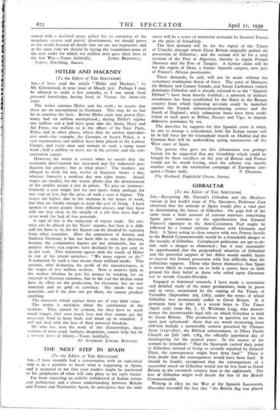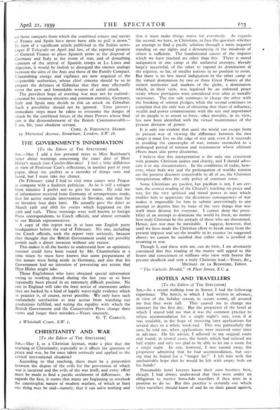GIBRALTAR •
[To the Editor of THE SPECTATOR] SIR,—Reviewing Mr. Garratt's Gibraltar and the Mediter- ranean in last week's issue of The Spectator, Professor Carr observed that the attitude of Spain would play a vital part in determining the future of Gibraltar. On page 618 of the same issue a brief account of current rumours concerning Spain gave utterance to the apprehension that General Franco's signature to the Anti-Comintern Pact might be followed by a formal military alliance with Germany and Italy. A Spain acting in close concert with two Powers hostile to the British Commonwealth would be a formidable danger to the security of Gibraltar. Complacent politicians are apt to de- ride such a danger as chimerical ; but it may reasonably be apprehended that the geographical situation of Gibraltar and the powerful support of her Allies would enable Spain to recover her former possession with less difficulty than the politicians suppose. Those who flatter themselves that Spain is never likely to venture on so bold a course have as little ground for their belief as those who relied upon Germany not to invade Czecho-Slovakia.
Engaged in historical research, I have made a systematic and detailed study of the many productions, both in prose and in verse, occasioned by the signing of the Treaty of Versailles (September 3rd, 1783), under the terms of which Gibraltar was permanently ceded to Great Britain. It is pertinent here to refer to a recent letter to The Times (April 15th) from Mr. L. G. Wickham Legg, who demon- strates the incontestable legal title on which Gibraltar is held by Great Britain. The productions in question are for the most part ephemeral: those that are worth recovering from oblivion include a memorable sermon preached by Thomas Scott (1747-1821), the Biblical commentator, in Olney Parish Church on July 29th, 1784, the officially appointed day of thanksgiving for the general peace. In the course of his sermon he remarked : "Had the Spaniards carried their point at Gibraltar, instead of being so severely repulsed by General Eliott, the consequences might have been fatal." There is little doubt that the consequences would have been fatal. It should be franldy recognised that the consequences of a successful attack on Gibraltar would not be less fatal to Great Britain in the twentieth century than in the eighteenth. The loss of Gibraltar might well decide the fate of the British Commonwealth.
Writing in 1833 on the War of the Spanish Succession, Macaulay recorded the fact that "the British flag was placed
on those ramparts from which the combined armies and navies of France and Spain have never been able to pull it down." In view of a significant article published in the Italian news- paper Ii Telegrafo on April 2nd last, of the reported promise of General Franco to place Spanish ports at the disposal of Germany and Italy in the event of war, and of disturbing rumours of the arrival of Spanish troops at La Linea and Algeciras, it would be foolish to disregard the sinister analogy between the aims of the Axis and those of the Family Compact. Unremitting energy and vigilance are now required of the csponsible authorities, whose chief concern should be so to prepare the defences of Gibraltar that they may effectually resist the new and formidable weapon of aerial attack.
The prevalent hope of averting war may not be realised : actuated by common interests and common enmities, Germany, Italy and Spain may decide to risk an attack on Gibraltar. Such a possibility should not be ignored. Time presses ; immediate steps must be taken to overcome the danger of attack by the combined forces of the three Powers whose final aim is the dismemberment of the British Commonwealth.— I am, Sir, your obedient servant,











































 Previous page
Previous page